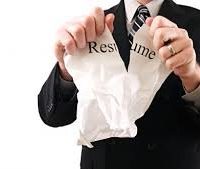1. Not having a professional summary or having a generic, poorly written one.
The professional summary is a three- to four-sentence paragraph that concisely presents your unique talents and skills. It also happens to be the most important part of your resume. Not having one, or having a shoddy one, can be a deal breaker for recruiters. Hone in on what sets you apart from other candidates and try to avoid industry jargon and clichés.
2. A poor format.
Let’s face it, there are some rough-looking resumes out there. Remember that recruiters and HR professionals spend a significant part of their day reading them. Put yourself in their shoes. Would you want to read a jumbled resume stuffed with dense blocks of 9-point text? Well, neither would they.
Keep your document clean, streamlined and easy on the eyes. Stick to a 10- or 11-point font and break up large blocks of text. White space is your friend.
3. Mechanical errors.
These are the worst because they’re so avoidable, yet so commonplace. You could be an ideal job candidate but if you’re mixing up “your” and “you’re” or misspelling the name of your current company, you’re unlikely to get very far in the job application process.
Be sure to review your resume carefully before submitting it. Then ask a friend or two to take a look in case you overlooked any errors.
4. Boring bullets that read like job descriptions.
If you’re like most people, the bullets in your resume’s work experience section read like a laundry list of job responsibilities. But this is actually a misguided approach that will do little to set you apart from the competition. Instead, your bullets should describe what you’ve accomplished in each position.
For example, let’s say you’re a public relations professional who secures media coverage for your clients. That’s great and certainly something you’ll want to mention in your resume. But even more impressive? The 30 percent sales increase your client experienced as a result of the media coverage you secured for them. That’s the stuff that gets you in the door for job interviews.
5. Longer than two pages.
Just as recruiters don’t want to read a resume that is verbose and disorganized, neither do they want to read a resume that reads more like a dissertation. No one’s resume should ever be longer than two pages. Even if you’re the CEO of a company. Even if you have 40 years of experience. Even if you’ve won more awards than Meryl Streep. Remember that your resume isn’t meant to be a catch-all for every detail of every single thing you’ve ever done in your career. It’s meant to serve as a concise, yet thorough snapshot of who you are, what you’ve accomplished, and what you have to offer potential employers. Two pages is plenty of space to achieve this goal.
*Author: Stacey Sykes, Writer, Communicati






Comments are closed.